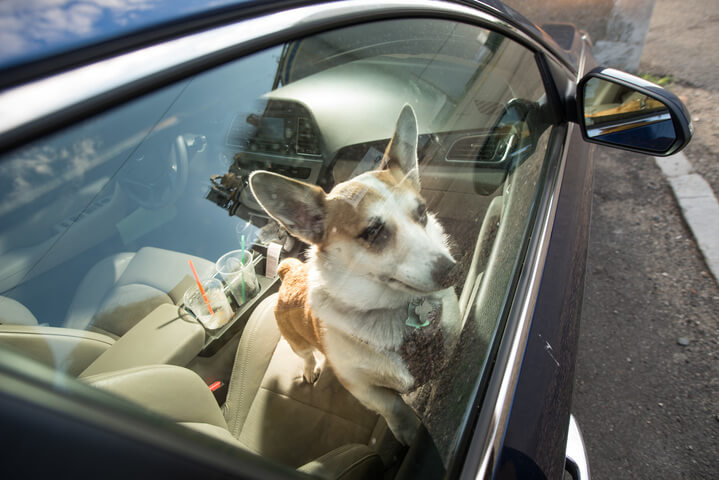Massachusetts lawmakers recently approved a package of bills intended to better protect animals, including one that might surprise people was needed: letting first responders and passersby break into locked cars on hot days to rescue a pet suffering from the heat. The proposed law has been approved unanimously in the Senate, but still must be approved by the House before the end of the legislative session July 31. If it passes, it will spell out more clearly when police, firefighters and good Samaritans can take action to save a pet. The danger of leaving children and pets in cars even with the windows cracked at the height of summer when temperatures inside vehicles can soar to well over 120 degrees has been well publicized. Yet, it continues to happen. About a week ago, police broke into two cars at the Wrentham Outlets to save dogs after being alerted by other shoppers that they were in danger.
Kara Holmquist , MSPCA’s director of advocacy, said even a state with “great” animal welfare laws like Massachusetts can use some clarification. Unlike 22 other states that have laws explicitly dealing with animals left in hot cars, Massachusetts does not. “We’ve spoken to animal control officers and other law enforcement officials who believe that this is a problem, and that the current laws can be improved upon,” she said.
Owners who leave their animals in a vehicle on a hot day can be prosecuted under the state’s animal cruelty laws, though that charge – a felony – has a higher legal threshold than what’s proposed in this legislation, Holmquist said. Under the existing law, first responders must believe an animal is in “imminent danger” before breaking into a hot car. The proposed law requires that officers believe conditions are “reasonably likely” to threaten the health and safety of the animal. “Part of the goal is to get the animals out of a hot car before they are suffering so much that … it’s an animal cruelty case,” Holmquist said. “By then they’ve suffered a lot, and could be close to death.” The bill would also let passersby break into a vehicle to save an animal suffering from the heat, provided they’ve met the requirements of the law, including calling 911 first. Civilians and first responders would be shielded from civil or criminal liability when making a reasonable, good faith effort to save an animal. It also imposes a $150 fine on first offenders.
Cambridge Animal Commission Director Mark McCabe said his office has received about six calls already this summer about pets left in hot cars and thatofficers in his department saved a dog Friday afternoon from inside a vehicle with an internal temperature of110 degrees. McCabe said enough witnesses were on hand that his office planned to file animal cruelty charges. “Most of the time, the only thing we are able to do is to talk with the ownerand make them aware of how fast a car can heat up,” he said.
At least one dog in the Boston area died this summer after its owner left it in a hot car. The man, a Brockton resident, is now facing animal cruelty charges.
“If we lived in a place that was hot all the time, maybe people would just think about it more,” Holmquist said. “When the summers come, they come fast, and we can have a really hot day very quickly. I think that sometimes people can be surprised by that. …Even on a day that we might consider mild, it can still be a dangerous situation.” The American Veterinary Medical Association recommends that dog owners leave their pets at home during the warm summer months, noting that temperatures inside of a vehicle can be as much as 40 degrees warmer than the air outside.
Proposal allows more leeway to save an animal locked in a hot vehicle

Derek Kouyoumjian


















